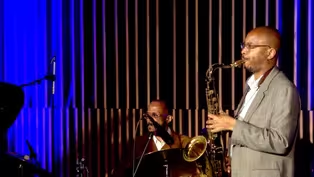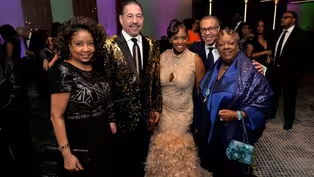
Civil rights attorney Ben Crump at The Wright Conversations
Clip: Season 52 Episode 16 | 8m 47sVideo has Closed Captions
Civil rights attorney Ben Crump talks social, racial justice at The Wright Conversations.
Civil rights attorney Benjamin Crump discusses the need for justice and equality in contemporary society and making the world a better place for the future during the Charles H. Wright Museum’s “The Wright Conversations” lecture series. The Wright Conversations series is a platform for dynamic discourse on issues ranging from civic engagement to cultural heritage.
Problems playing video? | Closed Captioning Feedback
Problems playing video? | Closed Captioning Feedback
American Black Journal is a local public television program presented by Detroit PBS

Civil rights attorney Ben Crump at The Wright Conversations
Clip: Season 52 Episode 16 | 8m 47sVideo has Closed Captions
Civil rights attorney Benjamin Crump discusses the need for justice and equality in contemporary society and making the world a better place for the future during the Charles H. Wright Museum’s “The Wright Conversations” lecture series. The Wright Conversations series is a platform for dynamic discourse on issues ranging from civic engagement to cultural heritage.
Problems playing video? | Closed Captioning Feedback
How to Watch American Black Journal
American Black Journal is available to stream on pbs.org and the free PBS App, available on iPhone, Apple TV, Android TV, Android smartphones, Amazon Fire TV, Amazon Fire Tablet, Roku, Samsung Smart TV, and Vizio.
Providing Support for PBS.org
Learn Moreabout PBS online sponsorship- One of this nation's most renowned civil rights attorneys was in Detroit recently advocating for racial and social justice in communities of color.
Ben Crump visited the Charles H. Wright Museum of African American History to take part in the lecture series with museum president and CEO Neil Barclay.
Here's a portion of Crump's opening remarks.
- I will make my argument this evening to you all.
May it please the court.
- [Audience Member] You may proceed.
- Thank you, your honor.
So...
The argument I wanna make is that... the enemies of equality will not win this battle.
People of good moral conscience will win this battle for our children to have a better future, a better world because we can make a better world and a better America where George Floyd gets an opportunity to take another breath without having a police officer's knee on his neck for nine minutes and 29 seconds while he says, "I can't breathe," 28 times.
And we can make a better world, a better America, where Breonna Taylor gets an opportunity to sleep in peace without the Louisville Metropolitan Police Department kicking open her front door at one o'clock in the morning and executing a unnecessary, a unjustifiable, and an unconstitutional and Judge Strong, I may add an illegal no-knock warrant because after we got involved, we were able to reveal that the police officers lied on the probable cause affidavit to entice the judge to sign the no-knock warrant in the first place.
And so we can make a better world, a better America, where Breonna gets to sleep in peace without them kicking in their front door and mutilating that sister in her own apartment, while she was practically naked in her nightgown, with eight bullet holes.
And we can give our children a better world, a better America, where Ahmaud Arbery gets to run free in Brunswick, Georgia, without being lynched for jogging while Black, not in 1940, Dr. Morgan, not in 1950.
We're talking about in 2020, in our day, they lynched that young brother.
We can give our children a better world, a better America, where all of them have an equal opportunity to their American promise of life and liberty and the pursuit of happiness.
We can do that but we got to be willing to speak truth to power.
We got to be willing to strategically fight this battle.
I remember, Mr. Evans, my grandmother, she told me, she said, "Baby, when you get a chance "to speak truth to power, you do it."
She said, "You do it."
She said, "It doesn't matter if they call you controversial.
"It doesn't matter if they call you a race-baiter.
"It doesn't matter if they say it's inconvenient."
She said, "When you get a chance to speak truth to power," she said, "You do it even if your knees are knocking."
She said, "Even if your palms are sweaty.
"Even if your heart is racing and your voice is cracking."
Robin, she said, "If you get a chance "to speak truth to power, you do it "because too many people sacrificed for you."
And so that's the first thing we do to win this war.
We simply have the courage to speak truth to power.
And then I submit to you, brothers and sisters, we must follow Martin Luther King's legal advice.
"What is Martin Luther King's legal advice," you ask?
Well, it's right there in his Letter from the Birmingham Jail.
And Robin, you've heard me talk about this.
I submit to you, Letter from the Birmingham Jail is one of the greatest essays ever written in the course of human history.
Yeah, it is profound.
And Mr. Barclay, I suggest everybody take a look at it when you get a chance because and remember the context of which it was produced.
Martin Luther King was there fighting for Black people to have a right to vote.
You know, it's kinda funny now, Mr. Evans, everybody, everybody loves King, everybody Martin Luther King.
Everybody who was supporting him when the reality was when Martin Luther King was down there fighting for equality for Black people, he was one of the most hated men in America, if not the world.
And so the members of the Minister Alliance, the white ministers, wrote a op-ed piece and put it on the front of the Birmingham newspaper.
And they called Martin Luther King everything but a child of God.
They said he was a outside agitator.
He was a race-baiter.
He was a troublemaker.
He should just go back where he came from.
They don't need him in Birmingham, Alabama.
They said that he should just wait and let things take its due course.
How long have Black people been waiting for things to take its due course?
And so his attorney, Fred Gray, another great omega man, came and visited him at the jail because the New York Times and others had asked him did he have a response to the ministers' message to him.
And so Dr. King took the newspaper and he started writing on the edges of the newspaper.
And then he covered all the front edges.
He turned it over, wrote on the back edges of the newspaper.
And then when nobody was looking, Fred Gray slipped him one sheet of his legal paper and he started writing on that there, front and back, Craig.
And then he gave it to Fred Gray to sneak out the jail.
And the New York Times published it.
And the rest is history.
Because the letter was so profound, we all remember parts of the letter.
Especially everybody remembers when he said, "Injustice anywhere is a threat to justice everywhere."
But I submit to you, I don't think that's the most profound part of the letter.
I think, Judge Strong, the most profound part of the letter is when Dr. King says, "We as moral people have an obligation "to oppose injustice when we see it."
He said, "If we gonna call ourselves good people, "you can't see evil and look the other way."
You know, he said, "Neutrality in the face "of injustice is a choice."
2024 Detroit Jazz Festival artist-in-residence Brian Blade
Video has Closed Captions
Clip: S52 Ep16 | 2m 13s | Detroit Jazz Festival artist-in-residence Brian Blade performs with The Fellowship Band. (2m 13s)
62nd Annual Barristers’ Ball returns to Detroit, celebrates the legacy of Motown music
Video has Closed Captions
Clip: S52 Ep16 | 12m 50s | The 62nd annual Barristers’ Ball returns to Detroit and celebrates the city's Motown era. (12m 50s)
Providing Support for PBS.org
Learn Moreabout PBS online sponsorship
- News and Public Affairs

Top journalists deliver compelling original analysis of the hour's headlines.

- News and Public Affairs

FRONTLINE is investigative journalism that questions, explains and changes our world.












Support for PBS provided by:
American Black Journal is a local public television program presented by Detroit PBS

